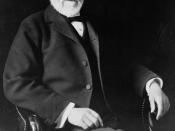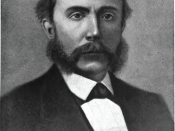Corporate development during the Industrial Revolution was made in part by entrepreneurs. Entrepreneurs were the people who took responsibility for the organization and operation of a new business venture. These business men often risked the initial money for setting up different types of businesses. With the risk of large sums of money, some of these entrepreneurs made enormous profits. Two major entrepreneurs of American history are John D. Rockefeller and Andrew Carnegie. The Standard Oil Company founded by John D. Rockefeller and the U.S. Steel Company founded by Andrew Carnegie, both were two corporations that had a great impact on the lives of most Americans. The Standard Oil Company and U.S. Steel Company were made successful in different ways due to the actions of their different owners. The companies differed in their labor relations, market control, and structural organization.
In the steel industry, Carnegie developed a system known as vertical integration.
This means that he simply cut out the middle man. Carnegie bought his own iron and coal mines, because using independent companies was unreliable, cost too much and were inefficient. By doing this he now was able to undersell his steel making competitors, because they had to pay the competitors they went through to get the raw materials. Unlike Andrew Carnegie, John D. Rockefeller integrated his oil business from top to bottom; his distinctive innovation in movement of American industry was horizontal. This meant he followed one product through all its stages. For example, Rockefeller controlled the oil when it was drilled, through the refining stage, and he maintained control over the refining process turning it into gasoline. Although these two powerful men used two different methods of management their businesses were still very successful.
Entrepreneurs or better known "Robber Barons" like Andrew Carnegie, "the steel king," and John D. Rockefeller, "the oil baron," exercised their genius in devising ways to circumvent competition. Although, Carnegie inclined to be tough-fisted in business, he was not a monopolist and disliked monopolistic trusts. John D. Rockefeller came to dominate the oil industry by bringing a new energy and overwhelming strategy into his business. With one upward stride after another he organized the Standard Oil Company, which was the nucleus of the great trust that was formed.
Rockefeller showed little mercy in his business dealings. He believed primitive savagery prevailed in the jungle world of business, where only the fittest survived (Social Darwinism). He pursued the policy of "ruin or rule." Rockefeller's oil monopoly did turn out a superior product at a relatively cheap price. Rockefeller believed in ruthless business, Carnegie did not, yet they both had the most successful companies in their industries. Rockefeller treated his customers and competitors in the same manner that Andrew Carnegie treated his workers: cruel and harsh. The Standard Oil Company desperately wanted every possible company to buy their products. For example Standard Oil used ruthless tactics when Rockefeller threatened to start his own chain of grocery stores and put local merchants out of business if they did not buy oil from Standard Oil Company. Carnegie dealt with his workers with the same cold lack of diplomacy and consideration. Carnegie would encourage an unfriendly competition between two of his workers and he goaded them into outdoing one another. Some of his employees found working under Carnegie unbearable. These rivalries became so important to the employees that some did not talk to each other for years. Although both Carnegie and Rockefeller created extremely successful companies, they both used unscrupulous methods in some aspect of their corporation building to get to the top.
The success of the Standard Oil Company and U.S. Steel company was credited to the fact that their owners ran them with great authority. In this very competitive time period, many new businesses were being formed. It took talented businessmen to get ahead and keep the companies running and make the fortunes that were made during this period. Thus, Carnegie and Rockefeller were both good for shaping American society in their own time and future generations.


